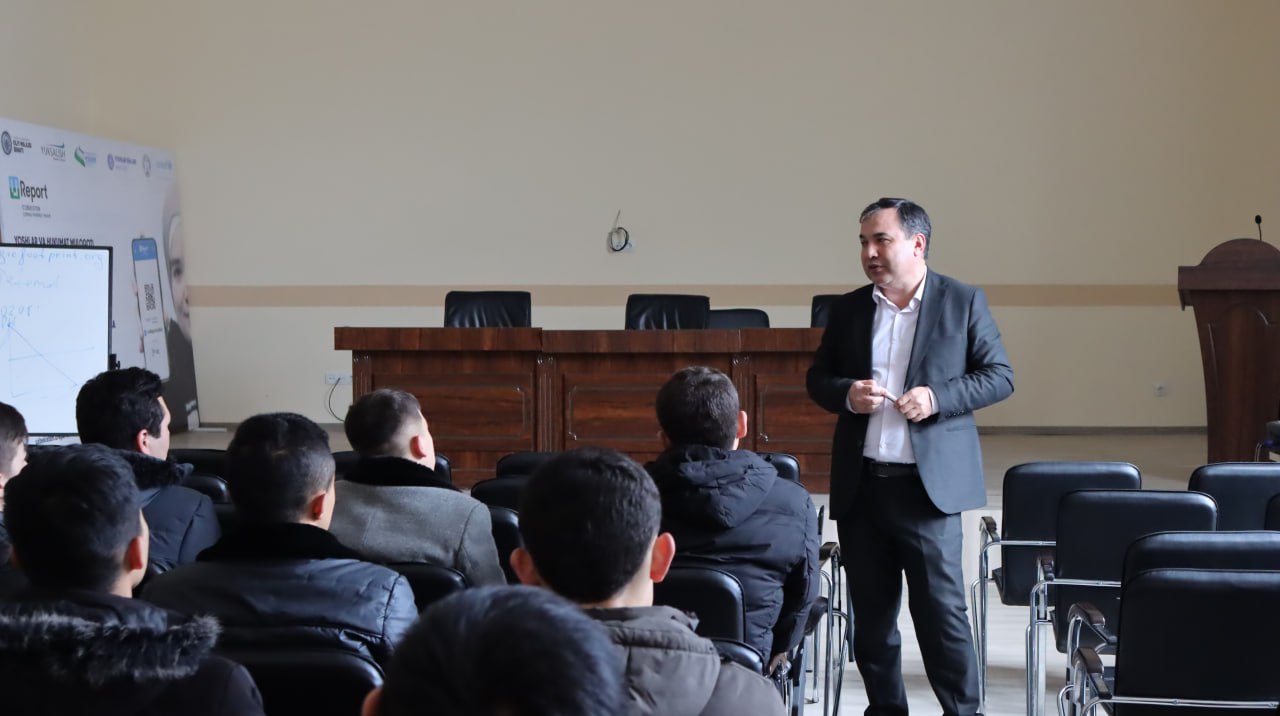Tashkent State University of Economics Samarkand branch held special training course on "Climate change and environmental adaptation".
14th of the "Action Plan" approved by Appendix 3 of the Decision PQ-436 of December 2, 2022 of the President of the Republic of Uzbekistan "On measures to increase the effectiveness of reforms aimed at the transition of the Republic of Uzbekistan to a "green" economy by 2030" In order to ensure the performance of the tasks specified in the paragraph, a special training course on "Climate change and ecological adaptation" is planned from January 26 to February 4 this year.
A special training course on "Climate change and ecological adaptation" was organized at the branch, involving qualified professors and teachers. Associate professor Z.Bobomuradov is organizing lectures on this subject for the 3rd level students, videos from the lesson process.
Curriculum of the special course "Climate change and ecological adaptation".
The curriculum of this special course is based on the decree of the President of the Republic of Uzbekistan dated December 2, 2022 "On measures to increase the effectiveness of reforms aimed at the transition of the Republic of Uzbekistan to the "Green" economy by 2030". To ensure the implementation of the tasks specified in the Action Plan "On the transition to a "green" economy and ensuring "green" growth in the Republic of Uzbekistan until 2030", as well as climate change among students aimed at forming knowledge and skills about the causes and factors of change.
Today, there is an increasing trend of natural and anthropogenic influences on nature around the world, as a result of which changes in the ecological state of the biosphere and climate change occur. Climate change and its instability are clearly reflected not only in the eyes of scientists, but also in the eyes of the entire world public. Typhoons, floods, tsunamis, droughts, heatwaves, rapid melting of glaciers, on the one hand, as a result of sudden weather changes, on the other hand, are becoming anomalous, i.e., unusual.
Of course, it is not easy for people who are not experts in this field to perceive and understand such climate changes. Natural disasters worried them more or less even in the periods of human society without drastic changes. Why is the climate warming happening in the next 20-30 years worried people? How are various rumors about natural disasters and climate warming emerging? How true is it that global climate change is the beginning of the next "ice age" and the opposite is happening?
What if there are many questions, but the answers lie outside the human mind and thinking? If you listen to Internet sites, articles that are constantly printed in newspapers, what is said on TV screens, and radio broadcasts, then a completely different picture is embodied before our eyes. As if living in a completely peaceful and peaceful time. It seems that the catastrophes happening in different regions of our planet have nothing to do with us.
Forming the ecological consciousness and culture of young people by explaining to the student the information about the climate and its changes in various forms and forms in a simple and fluent language, without excessive fuss, without sharp political and economic considerations. The concept of climate and weather, the mechanism of its change, objective and subjective causes and consequences, and international cooperation within the framework of global, regional and national territorial problems are discussed. In addition, it explains how students should behave and act in these stressful times.
The main thing is that every person, regardless of who he is and what kind of social status he has, can help his daily activities aimed at protecting the environment, rational use of natural resources, and restoration of damaged natural complexes by correctly understanding climate phenomena, making conscious decisions. Let's think about how our daily life goes.
When we wake up, we turn on the light. Then we turn on water for washing and gas for cooking breakfast. We use an iron to iron our clothes, turn on a hair dryer to dry our hair, turn on the TV to catch up on the latest news, and also use many other devices that cannot imagine our modern lifestyle without such technical devices. And then every morning we rush to study, we have to go to our intended destination by some means of transport, let's say a bus, tram, trolleybus, subway. Thousands of commuters like us use public transportation.
And when we come back from school, we turn on the TV, work on the computer, and turn on many other electrical devices. Electric tools work until we fall asleep. So, our life cannot be imagined without electricity. Electricity for our homes comes from various types of power plants, and coal, oil, and gas are burned to produce it. In time, saving energy will also help save these fossil resources.
In addition, improving the efficiency of electricity use will also reduce the bills paid to the electricity grid. After all, it is not for nothing that electricity bills are increasing day by day, because of the increase in the volume of fuels burned to generate energy. Our survival depends on our interconnectedness with each other and with nature on planet earth. We are entrusted with the responsible task of preserving nature, flora and fauna and preserving it for the future. We can live without energy.
Do not forget that our future development also depends on the production of energy sources that do not harm the environment and climate change. The problem we face is enormous, but to find a solution to it, we must first be focused on economy and a sense of responsibility. We should try to do the simplest things: for example, to use the energy at our disposal sparingly, to use environmentally friendly and efficient forms of energy.

